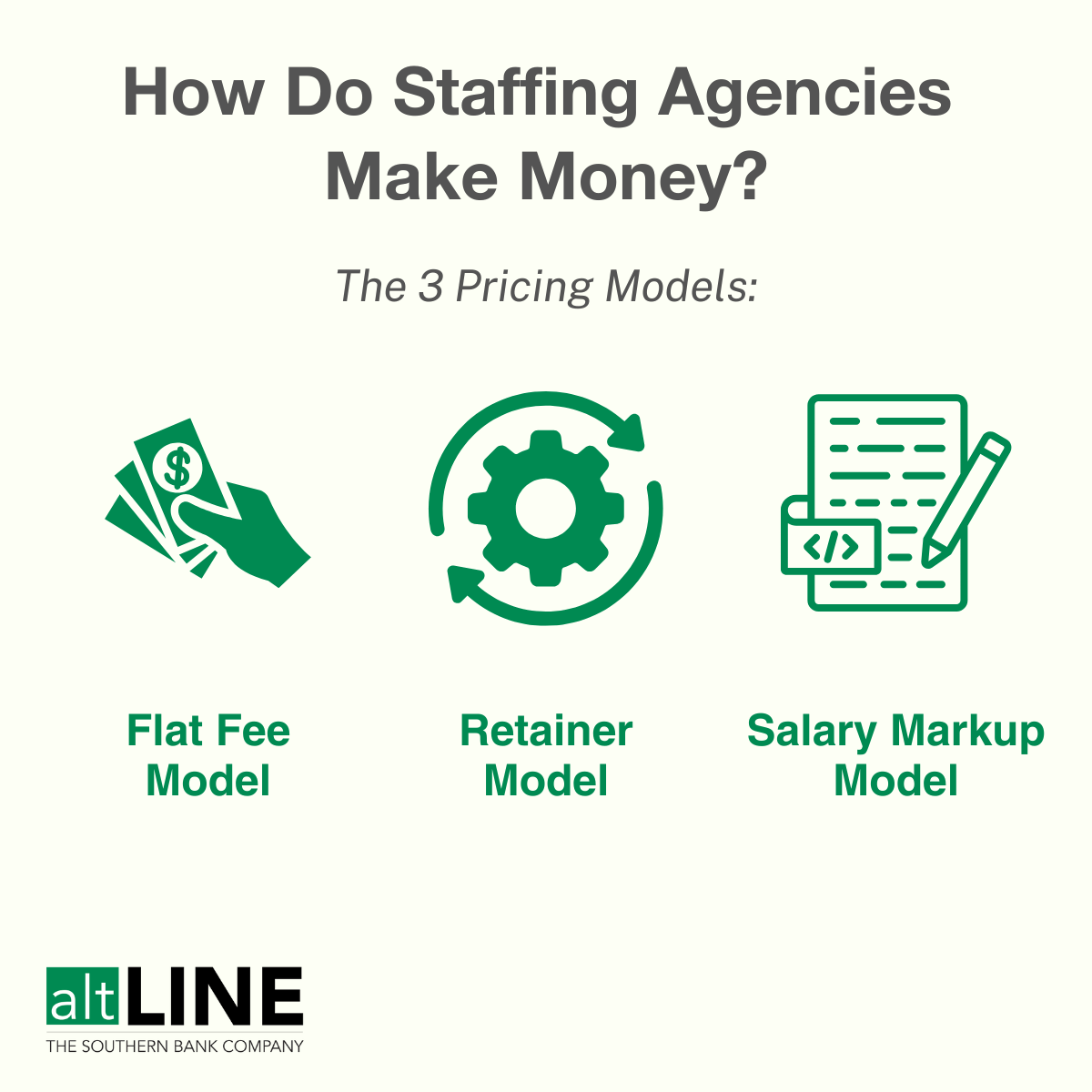Last Updated September 26, 2025
Running a successful staffing agency requires making enough money to manage business expenses while simultaneously generating enough markup per contract to continue generating profits.
But how exactly do recruitment and staffing agencies make money, and who pays them?
Recruitment and staffing agencies get paid by their clients who utilize their services, and this money typically comes in the form of one of three main pricing models:
- Flat Fee
- Retainer
- Percent of Salary (Salary Markup)
In this article, we will explore how each of these pricing models work to help you better understand how staffing and recruitment agencies make money.
Key Takeaways
- Staffing agencies make money through three main pricing models: flat fee, retainer, and salary markup, each offering unique advantages for different types of agencies.
- In a flat fee model, agencies charge a one-time fee per hire, making budgeting easier but limiting profit potential on high-salary roles.
- With a retainer model, employers pay agencies upfront for ongoing or exclusive recruitment services.
- The salary markup model ties agency revenue directly to employee wages, with agencies earning a percentage markup (typically 25–100%) on salaries or hourly rates.
How Staffing Companies Make Money in a Flat Fee Model
In a flat fee staffing arrangement, a fixed amount is negotiated as payment for recruiting workers, and this fee is negotiated and paid before the staffing agency starts sourcing candidates. It is not based on the skill set of the employee, the years of experience, or how much the employee’s salary is but is instead determined by the industry standard and business logistics.
The flat fee charged to recruit a candidate may vary from company to company. For example, a staffing agency may charge one company a $15k flat fee but charge another company a $20k fee.
This model of payment is cost-effective for both the employer and the staffing company. It makes budgeting easier for both employer and the agency as they have a set amount of money to plan with. It can also help the employer save money compared to other pricing models because the cost per hire is constant, so the employer does not have to pay more for employees that make a higher salary, as is the case with a salary markup model (see more on that below).
On the flipside, a staffing or recruitment firm may make less money on a flat fee staffing model compared to another model, such as a salary markup, since they would not be able to earn more for higher salaried roles.
Remember, before earning money from flat fee staffing, the first and most important step is to find staffing clients that are willing to pay.
How Staffing Agencies Make Money in a Retainer Model
In this model, the staffing agency receives payment as part of the employer’s company on a long-term or retainer basis.
This usually works well for startups that cannot afford an internal recruiting team or companies that want to incorporate a high level of expertise without directly hiring them.
This model is based on Recruitment Process Outsourcing (RPO), where a company outsources its recruitment to a third party which serves as an extension of the company. This is ideal for recruiting high-level positions, such as C-suite executives.
The payment model works similarly to flat fee staffing as payment is made for the placement services and not for the candidate. Unlike the salary markup where staffing agencies are only paid if the employer hires their candidates (see more on that below), retainers are paid before a candidate is found or placed in a role.
An advantage is that there’s no competition as the recruiting agency enjoys an exclusive working relationship with the employer.
How Staffing Agencies Make Money in a Salary Markup Model
In this payment model, the staffing agency earns money from a percentage of the employee’s first annual salary. This percentage is known as a markup and is added to the billed rate (hourly for contract or temporary positions or annually for full-time positions). The markup ranges between 25% to 100% on average. It’s up to each staffing agency to calculate unique markup rates.
For example, an employer contracts a staffing agency to find talent for a particular vacancy. If the annual salary is $60k, and the markup is 30%, the employer pays a total of $78k, in which $60k goes to the employee and $18k goes to the staffing agency. Or, if it’s a contract role with an hourly payment of $60 per hour with the same 30% markup, the staffing agency gets $18 per hour while the employee gets $60 per hour for as long as the contract runs.
The amount a staffing business can earn is directly tied to the employee’s salary, so a higher salary leads to higher earnings for the staffing agency. For full-time positions, staffing agencies are paid after a minimum period of employment which can range from between 30 to 90 days.
With all this said, staffing agencies typically negotiate rates with clients. An agency will rarely have fixed markup, as exact numbers are often negotiated with new clients before signing the contract.
In the case of contract or temporary workers, the staffing agency (not the employer) pays the workers. This is because the workers are employees of the staffing agency. The employer pays before the workers start working since it’s usually a day-rate arrangement. With an average of 3 million temporary and contract workers in America’s staffing agencies, it’s no surprise how these agencies make money.
Who Pays Staffing Fees?
Staffing fees are typically paid by the employer who contracts the services of a staffing or recruiting agency. In a few circumstances, staffing agencies also charge employees who are looking for work, but this is unethical as a part of the employee’s earnings typically already go to the staffing agency.
Before charging staffing fees, it’s important to understand how to price staffing services so you can pay the standard fees required to recruit a successful fit and not waste your time or run into a loss.
In-Summary: How Do Recruitment and Staffing Agencies Make Money?

Whether you’re starting your own staffing agency or you’re considering partnering with an employment agency to help find top employees, it’s very important to carefully analyze these pricing models to determine which best suits your business.
For example, an owner of a brand-new staffing firm might benefit most from working on a retainer model, which ensures payment for recruitment services even if a candidate is never placed in the open position.
These models demonstrate how money is funneled into a staffing company, but note that there are other, more indirect ways staffing agencies make money. For example, many agency owners have staffing referral programs, a fantastic way to find new business without having to put in much work.
How staffing companies get paid and make money is a bit more complex than your typical B2B or B2C company. However, the flexibility of pricing models can be seen as an opportunity to maximize your profits if you choose the right one for your staffing business.

How Staffing Agencies Make Money FAQs
How much does a staffing agency make per year?
How much a staffing agency makes per year will depend on a few factors, such as the industry the agency specializes in, which staffing model is most commonly used, and the size and age of the business. However, the average staffing agency owner brings home $114,182 per year, according to ZipRecruiter.
How much do staffing agencies make per employee?
Staffing agencies typically charge a 10-20% markup for permanent employees and anywhere from 20-75% for temporary employees, meaning how much a staffing agency makes per employee differs significantly based off employment type.
How much do staffing agencies charge clients?
Staffing agencies usually charge clients anywhere between 15-30% of the employees’ wages, will exact figures depending on factors such as type of placement, job title, and industry.
Deborah Sabinus is a content marketing writer who works across B2B SaaS and Finance industries. She specializes in bridging the gap between businesses and their audience through content. She is committed to helping readers understand complex topics and help them make informed decisions with content.








